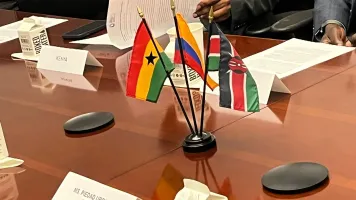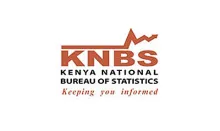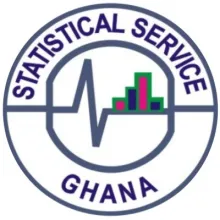The project, titled Make Inclusive Data the Norm: a South-to-South learning project between Colombia, Ghana and Kenya, aims to enable the three countries to learn from each other’s experiences and challenges in advancing inclusive data, which is essential for achieving the Leave No One Behind agenda and the Sustainable Development Goals (SDGs).
Make Inclusive Data the Norm was launched at a meeting of the Heads of the National Statistical Offices (NSOs) from Colombia, Ghana, and Kenya, held at the Colombia Permanent Mission to the UN Offices in New York on February 28, 2024, during the week of the UN Statistical Commission in New York. The launch was attended by representatives from the Global Partnership, the Deputy Permanent Representative of Colombia to the UN, Kenya’s Special Envoy on Technology, and the three National Statistical Offices (NSOs). The meeting served as an opportunity for the NSOs to introduce their current priorities and expectations for the project, and to foster a sense of collaboration and mutual learning among the three countries. The meeting also highlighted the achievements and challenges of each country in advancing inclusive data, and the potential areas of knowledge exchange and support.
Inclusive data reflects the realities of all people’s lives, especially those who are poor or marginalized, and is collected and used with their consent and participation. Inclusive data can help governments to design and monitor policies that are responsive to the needs and aspirations of different population groups, and to allocate resources effectively and equitably.
The initiative will focus on three aspects of inclusive data: data disaggregation and intersectionality, citizen data, and evidence-based policy. Disaggregated data and intersectionality help governments understand how various factors combine to create discrimination and exclusion. Citizen data is produced by people, individuals, or organizations to monitor issues that affect them.
The project will run for two years, from 2024 to 2025. It will involve a series of activities, such as webinars, case studies, workshops, peer-to-peer exchanges, and joint publications, to facilitate the sharing of knowledge and experiences among the three countries. The project will also produce a set of tools and resources on inclusive data that can be used by other countries and stakeholders interested in strengthening their data systems to be more inclusive.
The first learning exchange workshop is scheduled to begin on April 16th. It will bring together representatives from DANE, the national statistical agency of Colombia, Ghana Statistical Service, Kenya National Bureau of Statistics, as well as other relevant stakeholders from government ministries, public institutions, and civil society.
The main focus of the workshop will be to assess the countries' capacities and priorities for using disaggregated, intersectional, and citizen-generated data for monitoring and implementing the Sustainable Development Goals (SDGs). The exchange will help identify key areas for improvement and best practices.
Make Inclusive Data the Norm is part of the Global Partnership's broader efforts to promote and support inclusive data, as well as foster South-to-South learning between the participating countries and organizations. This initiative is a key component of the data revolution for sustainable development. The Global Partnership is a network of more than over 700 partners from governments, civil society, the private sector, academia, and international organizations, working together to harness the power of data for the public good.
APC-Colombia coordinates international cooperation for sustainable development in Colombia. They align resources, programs, and projects with the country's foreign policy and National Development Plan. Their experience in South-South cooperation and commitment to equity makes them an invaluable partner for Make Inclusive Data the Norm.
Quotes
"We are excited to launch this project with our partners from Colombia, Ghana, and Kenya, who champion inclusive data. Thanks to APC-Colombia for funding this initiative and strengthening collaboration in the global south. This project is the first south-to-south cooperation and peer learning aiming to inspire and inform other stakeholders to make inclusive data the norm." - Claire Melamed, CEO, Global Partnership for Sustainable Development Data.
“Our commitment to inclusion is not something new, we have made some great progress on the mainstreaming of the differential and intersectional approach, and we are eager to share our lessons learnt with others; nonetheless, there are key elements, specifically the role of the citizens on the data value chain, framed in a commitment to transition from a data subject view towards recognizing citizens as data advocates. Moreover, we see this project as an opportunity to recognize the role of south-south cooperation as a means of implementation for the fulfillment of the 2030 agenda; and thankfully, we have an institution such as APC Colombia that’s willing to make this investment. Through this knowledge exchange between Colombia, Ghana, and Kenya, we will expand tools for inclusive data systems, thus driving the development and implementation of urgent development policies through collaboration and mutual learning” - Piedad Urdinola, General Director, National Department of Statistics (DANE), Colombia
“We have made good progress in developing innovative methods and tools to ensure inclusivity and to provide better representation of marginalized groups and amplify their voices. We hope that through this partnership, we can further enhance our comprehension of the subject matter and jointly tackle the complexities, and thus ensure that inclusive data becomes a cornerstone of our collective pursuit of sustainable development.” - Prof. S.K Annim, Government Statistician, Ghana Statistical Service (GSS), Ghana.
“(Kenya has made significant milestones in harnessing citizen data for reporting on SDGs and so far up to 8 SDG indicators have benefited from citizen data. We have established mutually beneficial partnerships with the producers of citizen data and other stakeholders in this area, and even established a national Technical Working Committee on citizen data to foster collaborations and benefit from synergies in these works. We have also embarked on providing statistical literacy for producers of citizen data. Many of the civil societies have become strong advocates for statistics in the country.)” - Dr. MacDonald Obudho, Director General, Kenya National Bureau of Statistics (KNBS), Kenya.
“We are convinced that disaggregated data and statistics are critical to guide the design, implementation, and assessment of public policies and decisions, ensuring the inclusion of those in most vulnerable situations. This is a huge opportunity to advance in this regard and deliver on our international development commitments” - Arlene B Tickner, Deputy Permanent Representative of Colombia to the UN in New York.
Contact
Media contact:
Johua Omena, Campaign and Content Manager, Global Partnership for Sustainable Development Data
jomena@data4sdgs.org
For more information about the project, please contact:
Fredy Rodriguez Galvis, frodriguez@data4sdgs.org
Karen Bett, kbett@data4sdgs.org
Sebastían Sanchez Guerrero, sebastiansanchez@apccolombia.gov.co
Camilo Andres Mendez Coronado, camendezc@dane.gov.co



